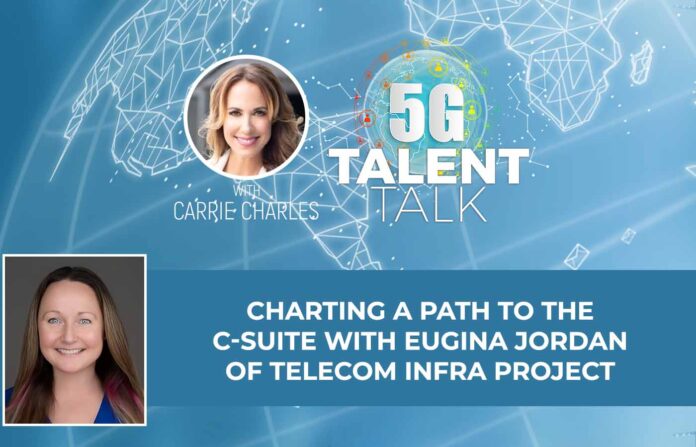Traditionally speaking, the telecommunications industry has been male-dominated with C-suite and corporate board room positions filled predominantly by men. But for women in telecom, this doesn’t mean that the C-Suite is out of reach. Joining host Carrie Charles for this episode of 5G Talent Talk is Eugina Jordan, CMO of Telecom Infra Project, to discuss her journey on climbing that corporate ladder and breaking into the C-Suite.
In the interview, Eugina discusses her path to the C-Suite, making note of the key skills needed to succeed and the importance of building relationships. Though this conversation is specific to women in the industry, the valuable insights and lessons on authenticity, imposter syndrome, personal branding, networking, and more make for an engaging episode beneficial to anyone looking to advance their career.
Listen to the podcast episode below for the full conversation, and make sure to check out her new book “UNLIMITED: The 17 Proven Laws for Success in a Workplace That Was Not Designed for You“, coming out May 2023.
—
Watch the episode here
Listen to the podcast here
Charting a Path to the C-Suite with Eugina Jordan of Telecom Infra Project
Thanks for joining me on the show. We are going to talk about how to break into the C-Suite. We are going to be speaking specifically to women in tech and telecom, but I believe that everyone can benefit from this episode. I would love to introduce you to our guest. I am very excited to have Eugina Jordan. She is the CMO of Telecom Infra Project, also known as TIP. She is a sought-after speaker and telecom writer contributing to publications like RCR Wireless, The Fast Mode, Developing Telecoms, and many others.
She’s also an inventor holding twelve patents that include 5G and Open RAN. Her passion is to help other women in tech realize their full potential. In fact, she has a new book that’s going to be released in May 2023. It is awesome. I read a great benefit. You will love it. It’s a leadership development book called UNLIMITED: The 17 Proven Laws for Success in a Workplace That Was Not Designed for You. She also won the outstanding achievement Diversity in Tech GLOMO Award by GSMA at the Mobile World Congress in 2023. She was a founding member of the Boston chapter of CHIEF, an organization for women in the C-Suite.
—
Eugina, thank you for joining me.
Thank you so much for having me.
I want to know all about the path that led you to where you are. I know it could probably take hours to get you here, but give us some highlights.
My journey started in communist Russia in 1970. The way I was raised and brought up was, “Keep your head down. Work hard. Don’t stand out. Don’t talk about your accomplishments.” I had to break a lot of my upbringing, values, and those triggers when I moved out of Russia. I am forever grateful to my mom. She was a single mom, raising me and my sister in communist Russia. The only thing she believed in is that her daughters deserved a better life than she had. She scraped enough money to send me and my sister to Canada.
All my life and all my achievements are because I always wanted to make her proud. I am who I am because of her. She taught me resilience and courage, and she made me believe in myself. I am the CMO though I was not born in the States. I don’t have a Marketing degree. I have a Master’s in Teaching and a computer undergrad from Canada. It’s because I knew that if I worked hard, played fair, constantly learned, negotiated, and believed in myself, I could be anything I want to be.
That is so true. That’s a beautiful story. I feel the same way about my mother as well, so that touched me. Tell me about your role and what you’re doing.
Let me give you some tips from the TIP CMO. TIP is Telecom Infra Project. It is an industry organization with one mission only, which is to bring open and disaggregated innovation to the market and accelerate innovation in telecom. We are a community. We believe in the power of the community. In our community, we have mobile operators, vendors, and system integrators.
What we do is jointly develop roadmaps, open and desegregated, and solutions for RAM, Transport, and Wi-Fi. After we develop the roadmaps as a community, we test and validate them through TIP. We then provide those blueprints to mobile operators. By deploying TIP-developed solutions, they know it can be deployed in real-life. Our most successful deployments are in openRAM and Open Transport. If we use an analogy, we are a matchmaker. We’re like Match.com for telecom solutions. I love Match.com because that’s how I met my husband several years ago.
That’s great. It does work.
Telecom Infra Project works as Match.com for open and disaggregated.
I know that you have such a passion for women in tech and growth. Although we’d like it to be different, there’s still a disparity there. I know that there are not enough women in C-Suite roles, especially in tech and telecom. What would you say are the roadblocks for women on their way to the C-Suite?
You are right. If we look at data in telecom, 35% of women are entering telecom. As we progress to the C-Suite, we only have 12% of female representation in the telecom C-Suite. Why do we lose that 23%? Why don’t they make it to the C-Suite? I personally believe the main roadblock is ourselves. If someone told me many years ago when I started in the industry as a receptionist that I cannot be CMO or Chief Marketing Officer because of not having this or being from certain background or gender, I would look at them and ask them the question, “Why not me?” The biggest barrier is us women not believing in ourselves and not asking that question.
Thirty-five of those who enter telecom are women. As we progress to the C-suite, we only have 12% of female representation. Why do we lose that 23%? The main roadblock is ourselves.
I love that because so many times, we’ll ask ourselves, “Why me?” Instead, ask a different question, “Why not me?” It’s so powerful. In the book, you talk about navigating the system. What does this mean?
In ’95, I moved from Russia to Canada. In 2000, I moved here. I was looking for a job after 9/11 in 2001 when there were no jobs. I did not know that a system existed or Corporate America existed. I was coming from a different culture, so I didn’t know that the system was developed by White men for White men.
When I entered the system, I believe that if I worked hard, I could become anything. This is what I was taught in school and by my mom in Russia and Canada. Working hard in this system, though you might be brilliant at what you do, is not enough. You need to have two things. One of them is you need to have a mentor and a sponsor, and there are differences between them. A mentor is someone that can help you realize your full potential. A sponsor is someone based on your hard work or fire in the belly that they see will give you the opportunity. That’s number one, having support in the system within the system.
Number two is realizing that this system is like matter. Bozoma Saint John is the very famous CMO of Nike and Uber. She has this concept of matter in a molecular. It is when molecular enter matter. When Eugina enters a system, a corporate environment, and telecom, the system will change me, but also, Eugina will change the system.
It’s realizing that it’s not forgetting who you are. It’s not adjusting and feeding into the system. Growing in the system and staying offensive to who you are is what’s going to make you successful in the system. Those two things, the mentors and sponsors, being offensive to who you are and willing to challenge the system will bring new ideas. Be yourself.

Let’s dig into those a little bit. Let’s talk about mentors and sponsors first. I want to clarify this distinction. Also, how do we find a sponsor, and how do we maximize that relationship?
It is very hard for women to find sponsors only because on the top layer, the majority are men. I gave you the number. It’s 12%, so 88% of men in the C-Suite. Unfortunately, there is a bias. Men normally would sponsor or mentor someone that looks like them or someone that reminds them of being young, in college, and ambitious. If a woman wants to find a sponsor that will help her get interesting projects or new opportunities, she needs to earn it.
Let me tell you a story about how I was sponsored into a marketing position. The year was 2007. I was divorced. I was a single parent. I was working as an executive assistant to the chief of staff managing the board of directors. I was good at what I did and I enjoyed it, but I realized there was no growth. I was 36 at that time, and I wanted to grow.
I found out that there was an opening for a marketing manager. I wanted that job because I knew once the opportunity is given, I’m going to excel. It was January 2007. I walked into my boss’ office who was the CEO of that company and asked him for an internal transfer. It was scary. I remember I didn’t know what to expect. I was holding my breath as I was asking for the transfer.
I remember him getting up from his desk, heading to me because I was standing in front of him, giving me a big hug, and saying, “I’m going to miss you, but I cannot prevent you from growing.” Why did he sponsor me into a new role? Why did he give me this opportunity? It was because for the six years prior, I earned it. I earned his trust. I worked very hard. He knew based on my work history and my accomplishments that I would succeed in the new role.
When we ask someone to be our sponsor, would that be appropriate?
It is appropriate. You can go to a person that you don’t know. There are three steps to identifying a sponsor. A sponsor is someone normally in your organization that can give you that opportunity or an interesting project. Mentors can be outside of your organization, but sponsors are normally within your organization. Identifying those key people that can give you those opportunities is step number one.
Step number two is asking for a meeting and having an honest conversation with that person about your ambition and growth. You’re asking how you can help them. It’s not asking for a promotion right away because in some cases, they might not even know who you are and what you do. You are asking how you can help them and proving yourself. Once you proved yourself, it is asking for those opportunities, projects, or promotions. That would be step three.
I want to go back to authenticity because you talked about this earlier. This is such a powerful topic, especially for women. You talk about in the book being authentic at work. You said never apologize for being yourself. There have been times even in my own life when I felt like I had to act differently or be someone different in certain situations. How do we be our full selves, but at the same time, have our eye on those career goals and make all of that work?
The way I see it is if I don’t tell my full story or I don’t control my narrative about myself, then someone else will. Authenticity comes from accepting every part of our story. Ursula Burns, the first Black CEO, wrote a wonderful book, Where You Are Is Not Who You Are. “Who you are is not where you are,” is one of the quotes from that book. Being authentic is realizing that all parts of your story are what made you you. It is accepting that you might not have had a perfect childhood or gone to the perfect college, but you still deserve a place at the table.
Authenticity comes from accepting every part of your story. If you don’t control your narrative about yourself, then someone else will.
Bringing your whole self to work is bringing all those parts of the story. For example, I’m a Russian immigrant. I was a single mom. I am not an engineer. I have a computer undergrad. All those pieces of this story make me. By sharing that story at the beginning of conversations or sharing it on digital channels, I allow people to see who I am as a human.
That is so true. The older I get, I’ve learned this lesson. I would love to see women learning this at a younger age. You can be you. Be everything that you are. Let go of the shame or anything that’s holding you back from being you. I appreciate that conversation.
You said shame, there is a Brené Brown talk Listening to Shame. It’s one of the best TED Talks that are out there. You are right. The reason we don’t bring our full selves to work is that we’re afraid we’re going to be judged. We’re like, “They’re going to judge me because I grew up poor. I didn’t go to the best college.” Authenticity is realizing that we all have broken places or vulnerable places. It’s using your vulnerable self to display your authentic self, being courageous, and telling all parts of your story.
How do we overcome Imposter syndrome?
That’s one of my laws. It’s the Law of Accomplishment. As women, we’re underrepresented. Especially in the culture I grew up in, the Russian culture, we don’t feel comfortable or we feel it’s rude to talk about our accomplishments. Realizing that we’ve accomplished a lot helps fight the Imposter syndrome. I would suggest to people that are reading to take a piece of paper and write down all their accomplishments. If you run out of paper, roll it around and keep writing. I bet there are so many accomplishments that are going to be written on that piece of paper.
The only way to shut that Imposter syndrome up is to change the way we think. As humans, we can change our thought processes. Instead of saying, “I shouldn’t apply for this job because I only have 80% of the qualifications,” we should say, “This job is so perfect for me because I have 80% of what they’re looking for. I only have to learn 20%. That is a piece of cake.”
It’s a perception shift. You mentioned self-promotion. I know that a lot of people have challenges with self-promotion and personal branding. Those are buzzwords, and we know we have to do it in order to get to that next level. Will we ever become comfortable with self-promotion or do we need to get out there and do it? Can you also address with that how introverts can self-promote and network? I know you discussed that in your book.
I would say get out and do it. If you are not talking about your accomplishments, someone else will. I can again tell a story from when I was laid off in June 2022. I had a very strong digital brand on LinkedIn. I’ve built a large network in telecom and across executive women in the US and globally. When I got laid off, I posted on the LinkedIn platform that I was laid off but also hundreds of other talented people are laid off, I asked for help and people helped. They sent jobs our way. They created special task forces for those people. Me having a strong personal brand helped other people get jobs. It was never a self-promotion. It was a service to people like me.
I feel the same way. I mentor people as well. When I’m coaching, I’ll say, “Make it bigger than you because when it’s all about you, it may feel uncomfortable. When you make it bigger than you as a service to other people, then it takes on a different life.”
It’s a service to people like you. It’s a service to your company because you having a digital brand on LinkedIn or in different publications, webinars, events, or speaking promotes them as well. It gives your company visibility. It’s also a service to your company. Reframing it this way as a service to others will help to look at this not as a self-promotion, but as a service.
It’s the same with networking. Your other question was about how introverts can network. The way I look at networking as a service when I network is I want to learn about another human. Before this show, I was having lunch with a LinkedIn friend. She reached out and offered to go out and have lunch. I went and got to know another human. If you look from that standpoint that you are learning something interesting about another human, it’s not as difficult to network because it’s human.

Another area that we often find discomfort in is negotiation. It could be negotiating for the next level. I don’t know if we feel confident here and trained here. I have so many women that will call me and they’ll say, “I need to get a raise or ask for something. I’ve got this new job. I need to get this particular thing. What do I do?” What are your thoughts on the art of negotiation? How do we get better at it?
There are three steps again. Step one, always negotiate. If we don’t negotiate early on in our career, data shows we’re leaving about $1 million on the table throughout our career. It’s one million reasons for everyone to negotiate. Number two, when you negotiate, don’t negotiate for money. Negotiate for access to meetings, classes, coaching, flexibility, time, and more. Negotiate for what will make your life whole and that you will enjoy your career. Don’t always negotiate on money. Look at the overall package. It’s not the financial package, but the package that will feed your life. Number three, remember step number one. Always negotiate.
That’s great. We tend to connect the negotiation with our self-worth, and then it becomes emotional. You talk about how to take the emotions out of it. That can be difficult at times. How do we do that?
It’s very interesting that you’re bringing that up. In my book, I talk about how men would do it. When women or other underrepresented groups like immigrants like me fail. For example, we always go do soul searching. Men don’t. They always ask for a 2nd, 3rd, and 4th chance. Why not use the best practices of the people that build the system?

What do men do? They always negotiate because it works. It’s part of the system. It’s part of the process. Negotiation is not going to ruin any relationship. As women, we always think, “If I go and negotiate, I might hurt the feelings. If they say no, they’re going to think this way about me.” Self-promotion and negotiation are expected. By not negotiating, we’re doing a disservice to ourselves. Ladies, go out there and negotiate.
We want that $1 million that is left on the table. Don’t leave that there. The one thing I found so interesting in your book is something you call Perfecting Your Craft. There was this quote that I loved, which is, “You must immerse yourself in your work. You have to fall in love with your work. You must dedicate your life to mastering your skill. That’s the secret of success.” What is this idea around perfecting your craft? I know we want to learn all different types of things. We want our hands on different projects. A lot of people don’t stay on the job longer than a year and a half. Talk about perfecting your craft.
I wouldn’t be in here if I didn’t perfect my craft as a marketer. Like a good wine or scotch, it takes time, learning, and patience. My husband is a scotch drinker. He always tells me it takes time from 10 to 15 years. Any paintings by da Vinci and Michelangelo take time. Perfecting your craft is based on time. It’s at least 10,000 hours. It’s based on passion because you need to feel passionate about it. If you don’t feel passionate about it, then maybe it’s time to go elsewhere.
I know it’s silly, but I’m passionate about open and desegregated. I wouldn’t have written 70 articles about it during COVID if I didn’t feel passionate about the innovation. The last one in addition to investing time and passion is to be open to learning, listening to podcasts, reading, talking to people, and figuring out where that might take you in the future as well.
I love this because I’m a very passionate person. I never picked one skill, one industry, or one thing to do. I did it for 20 to 30 years. I’ve been involved in so many different things that have led me to where I am. I love this because it is this idea around mastering your skill. It’s everything I’ve done even though it’s all different. There’s one common thread with our passion, and if we master that, then that’s the ticket to our success. Would you say that’s true?
Yes. Success and happiness. There’s no redo in life. It’s not like if you are unhappy at your job or in your personal life, magically in 70 or 80 years, you’re going to have another life. There is no redo. We need to find passion in our personal and professional lives. Don’t settle for anything but passion, love, and happiness. That will lead to success.
There is no redo in life. Don’t settle for anything less than passion, love, and happiness. That will lead to success.
In one of my favorite songs, the lyrics say, “Don’t settle for anything less than everything.”
Don’t be afraid to be an underdog because the movie that won many Oscars was an underdog movie. All those actors and actresses were underdogs. Do you. Find your passion and settle for everything.
I love this conversation. I want to talk about specific takeaways or a step. In your view, what is the first step to take or a step that we can take if the C-Suite is our ultimate goal?
It’s one word. Plan. You need to create a plan. It needs to be on paper. It needs to be with the milestones. It needs to be with objectives. You need to track yourself because if you don’t put it on paper, then you are not going to hold yourself accountable. Holding yourself accountable is important. For example, I create my plan in December of each year during Christmas week. I create a plan across all my role because I’m a professional. I’m a chief marketing officer. I’m also an author and passionate about women and technology. I’m also a mom. I have a high school senior. I’m a wife. I have an extended family. I have friends. You need to plan your career the way that you will also have a life.
It’s about being intentional. You have to be intentional. You can’t let it unfold.
Unfortunately, no one is going to give you anything. You have to work for everything. Please work on step goals for yourself. Many of you that are reading are very successful at what you do because you have goals, objectives, and KPIs. You measure and adjust. Why don’t you apply the same principle to your career? You create a plan, milestones, and KPIs. As with your work, become intentional with your career planning as well.
We can end it right there. That is well said. That is amazing advice. First of all, where can we buy your book? I know it will be released on May 23rd, 2023. Also, if we want to connect with you, how do we do that?
LinkedIn is my jam. I’m on LinkedIn @EuginaJordan. I’m the only Eugina Jordan on LinkedIn. You can pre-order the book on EuginaJordan.com. There is a pre-order button. Thank you very much for your support because as an industry and a community, together, we can change the face of leadership.
You are so right. Thank you for who you are and all you do for this industry and for women. We need more people in the world like you. Thank you for coming to the show.
Thank you so much for having me.
You take care.
Important Links
- Telecom Infra Project
- UNLIMITED: The 17 Proven Laws for Success in a Workplace That Was Not Designed for You
- CHIEF
- Match.com
- Where You Are Is Not Who You Are
- Listening to Shame
- @EuginaJordan – LinkedIn
- EuginaJordan.com
About Eugina Jordan
 Eugina, a female Executive and an immigrant started her telecom career as a secretary and now has become the CMO of the prominent industry organization Telecom Infra Project (TIP).
Eugina, a female Executive and an immigrant started her telecom career as a secretary and now has become the CMO of the prominent industry organization Telecom Infra Project (TIP).
She is a well-sought-after speaker at many technology and telecom events and webinars. She is a well-known telecom writer contributing to publications like “RCR Wireless,” “The Fast Mode,” “Developing Telecoms” and many others.
She is also an inventor, holding 12 patents that include 5G and Open RAN.
Her passion is to help other women in tech realize their full potential through mentorships, community engagement, and workshops. Her leadership development book “UNLIMITED: The 17 proven laws for success in a workplace not designed for you” will be released in May 2023.
She won the outstanding achievement “Diversity in Tech” GLOMO Award by GSMA at Mobile World Congress 2023.
She was a founding member of the Boston chapter of CHIEF, an organization for women in the C-Suite, to strengthen their leadership, magnify their influence, pave the way to bring others, cross-pollinate power across industries, and effect change from the top down.
Ms. Jordan resides in Massachusetts with her husband, teenage son, and three rescue dogs. Ms. Jordan has a Master’s in Teaching from Moscow Pedagogical University and studied computer undergrad at CDI College in Toronto, Canada.

